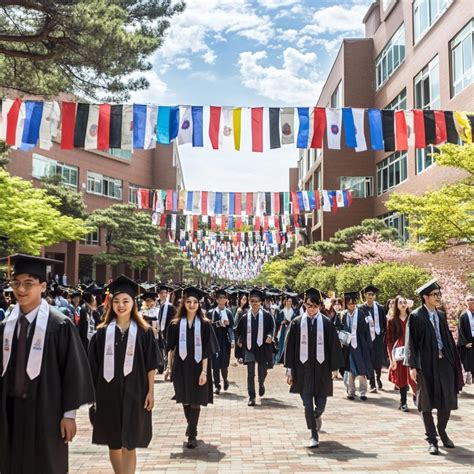Navigating the Maze of Scholarship Opportunities

Embarking on a higher education journey can be an exhilarating yet daunting endeavor, especially when financial constraints loom large. For Korean students, there is a plethora of scholarship opportunities available to alleviate financial burdens and empower academic pursuits. This comprehensive guide will illuminate the various avenues through which Korean students can secure financial support, enabling them to realize their educational aspirations.
Types of Scholarships
The scholarship landscape for Korean students encompasses a diverse array of offerings, each tailored to specific criteria and requirements. Some of the most common types of scholarships include:
- Government Scholarships: These scholarships are funded by the Korean government and are awarded to students demonstrating academic excellence, financial need, and a commitment to public service.
- University Scholarships: Many universities in Korea offer their own scholarship programs to attract and retain top students. These scholarships may be based on academic merit, research potential, or other criteria.
- Private Scholarships: Various organizations, foundations, and corporations offer scholarships to students who meet specific eligibility requirements, such as belonging to a particular ethnic group or pursuing a specific field of study.
- International Scholarships: Korean students can also apply for scholarships offered by universities and organizations worldwide. These scholarships are typically awarded to students with outstanding academic achievements and the potential to contribute to global society.
Eligibility Requirements
The eligibility requirements for scholarships vary widely depending on the funding organization. However, some general criteria that are commonly considered include:
- Academic Performance: Students with strong academic records are more likely to be awarded scholarships.
- Financial Need: Scholarships are often designed to support students who face financial challenges.
- Field of Study: Some scholarships are restricted to students pursuing certain fields of study, such as STEM or the arts.
- Citizenship: Many scholarships are only open to students who are Korean citizens or permanent residents.
- Age: Some scholarships have age restrictions, such as being limited to students below a certain age.
Application Process
Applying for scholarships can be a competitive process, and it is essential to approach the application process with thoroughness and attention to detail. Here are some key steps to follow:
- Research and Identify Scholarships: Explore various scholarship databases and websites to identify scholarships that align with your interests and qualifications.
- Gather Required Documents: Most scholarship applications require supporting documents such as transcripts, letters of recommendation, and personal statements.
- Complete Applications Carefully: Fill out scholarship applications meticulously, ensuring that all fields are completed accurately and that you meet all eligibility requirements.
- Meet Deadlines: Submit your applications well in advance of the deadlines to avoid missing out on opportunities.
- Follow Up: After submitting your applications, follow up with the scholarship organizations to inquire about the status of your application.
Useful Tables
To provide further insights into the scholarship landscape, here are four useful tables summarizing key information:
| Scholarship Type | Funding Source | Eligibility Requirements | Examples |
|---|---|---|---|
| Government Scholarships | Korean government | Academic excellence, financial need, public service commitment | Global Korea Scholarship, Korean Government Scholarship Program |
| University Scholarships | Korean universities | Academic merit, research potential | Seoul National University Scholarship, Yonsei University Scholarship |
| Private Scholarships | Organizations, foundations, corporations | Varying criteria, often based on ethnic background or field of study | SK Group Scholarship, Samsung Scholarship |
| International Scholarships | Universities, organizations worldwide | Outstanding academic achievements, global contribution potential | Fulbright Scholarship, Chevening Scholarship |
Effective Strategies
To increase your chances of securing a scholarship, consider employing the following effective strategies:
- Start Early: Begin your scholarship search well before deadlines to give yourself ample time to prepare your applications.
- Network: Attend scholarship fairs, connect with university counselors, and reach out to potential mentors to learn about scholarship opportunities.
- Tailor Your Applications: Customize your application to fit each scholarship’s requirements and highlight your unique strengths and experiences.
- Be Diligent: Dedicate time and effort to researching scholarships, preparing applications, and following up with organizations.
- Seek Feedback: Ask trusted individuals, such as teachers, advisors, or scholarship winners, to review your applications and provide constructive criticism.
FAQs
1. Can I apply for multiple scholarships at once?
Yes, you can apply for multiple scholarships, but be sure to check the eligibility requirements and deadlines for each scholarship carefully.
2. What if I don’t meet the GPA requirement for a scholarship?
Some scholarships consider factors beyond GPA, such as extracurricular activities, research experience, or personal circumstances. Explore scholarships that align with your strengths and qualifications.
3. Are there scholarships available for international students in Korea?
Yes, there are a number of scholarships available for international students studying in Korea. Explore scholarship databases and consult with international student support offices at universities.
4. How do I find out about upcoming scholarship opportunities?
Follow scholarship databases, subscribe to scholarship newsletters, and connect with university counseling centers for updates on upcoming opportunities.
5. What are some tips for writing a strong scholarship essay?
Tell a compelling story that highlights your unique experiences, aspirations, and how the scholarship will contribute to your future success. Be specific, provide evidence, and demonstrate your written communication skills.
6. Can I negotiate the amount of a scholarship award?
In most cases, scholarship awards are non-negotiable. However, you can contact the scholarship organization to inquire about any possible adjustments or additional funding opportunities.
7. What should I do if I am offered multiple scholarships?
Consider the scholarship terms, including the amount, duration, and specific requirements. Choose the scholarship that best aligns with your financial needs and career goals.
8. How do I express my gratitude for receiving a scholarship?
Write a heartfelt thank-you note to the scholarship organization, acknowledging their support and expressing your appreciation. Consider connecting with the organization on LinkedIn or other platforms to maintain a professional relationship.
